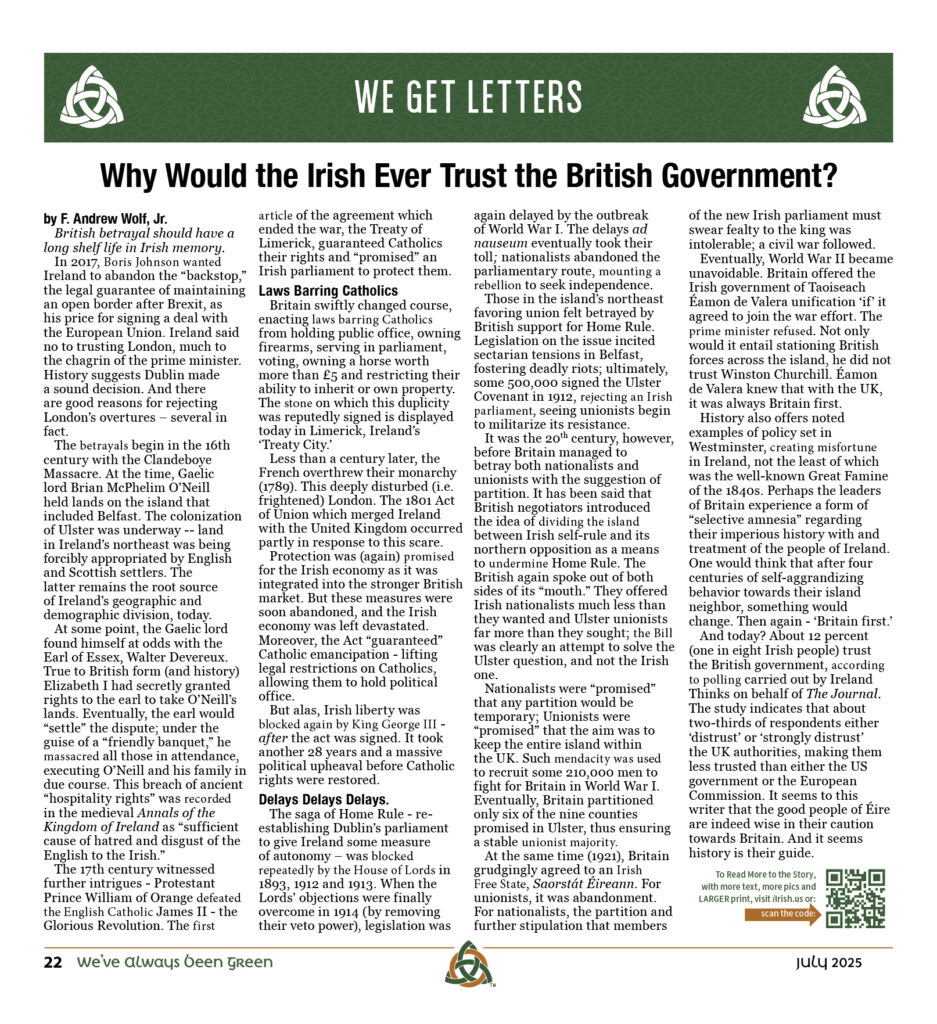By F. Andrew Wolf, Jr.
British betrayal should have a long shelf life in Irish memory.
In 2017, Boris Johnson wanted Ireland to abandon the “backstop,” the legal guarantee of maintaining an open border after Brexit, as his price for signing a deal with the European Union. Ireland said no to trusting London, much to the chagrin of the prime minister. History suggests Dublin made a sound decision. And there are good reasons for rejecting London’s overtures – several in fact.
The betrayals begin in the 16th century with the Clandeboye Massacre. At the time, Gaelic lord Brian McPhelim O’Neill held lands on the island that included Belfast. The colonization of Ulster was underway — land in Ireland’s northeast was being forcibly appropriated by English and Scottish settlers. The latter remains the root source of Ireland’s geographic and demographic division, today.
At some point, the Gaelic lord found himself at odds with the Earl of Essex, Walter Devereux. True to British form (and history) Elizabeth I had secretly granted rights to the earl to take O’Neill’s lands. Eventually, the earl would “settle” the dispute; under the guise of a “friendly banquet,” he massacred all those in attendance, executing O’Neill and his family in due course. This breach of ancient “hospitality rights” was recorded in the medieval Annals of the Kingdom of Ireland as “sufficient cause of hatred and disgust of the English to the Irish.” The 17th century witnessed further intrigues – Protestant Prince William of Orange defeated the English Catholic James II – the Glorious Revolution. The first article of the agreement which ended the war, the Treaty of Limerick, guaranteed Catholics their rights and “promised” an Irish parliament to protect them.
Laws Barring Catholics
Britain swiftly changed course, enacting laws barring Catholics from holding public office, owning firearms, serving in parliament, voting, owning a horse worth more than £5 and restricting their ability to inherit or own property. The stone on which this duplicity was reputedly signed is displayed today in Limerick, Ireland’s ‘Treaty City.’
Less than a century later, the French overthrew their monarchy (1789). This deeply disturbed (i.e. frightened) London. The 1801 Act of Union which merged Ireland with the United Kingdom occurred partly in response to this scare.
Protection was (again) promised for the Irish economy as it was integrated into the stronger British market. But these measures were soon abandoned, and the Irish economy was left devastated. Moreover, the Act “guaranteed” Catholic emancipation – lifting legal restrictions on Catholics, allowing them to hold political office.
But alas, Irish liberty was blocked again by King George III – after the act was signed. It took another 28 years and a massive political upheaval before Catholic rights were restored.
Delays Delays Delays
The saga of Home Rule – re-establishing Dublin’s parliament to give Ireland some measure of autonomy – was blocked repeatedly by the House of Lords in 1893, 1912 and 1913. When the Lords’ objections were finally overcome in 1914 (by removing their veto power), legislation was again delayed by the outbreak of World War I. The delays ad nauseum eventually took their toll; nationalists abandoned the parliamentary route, mounting a rebellion to seek independence.
Those in the island’s northeast favoring union felt betrayed by British support for Home Rule. Legislation on the issue incited sectarian tensions in Belfast, fostering deadly riots; ultimately, some 500,000 signed the Ulster Covenant in 1912, rejecting an Irish parliament, seeing unionists begin to militarize its resistance.
It was the 20th century, however, before Britain managed to betray bothnationalists and unionists with the suggestion of partition. It has been said that British negotiators introduced the idea of dividing the island between Irish self-rule and its northern opposition as a means to undermine Home Rule. The British again spoke out of both sides of its “mouth.” They offered Irish nationalists much less than they wanted and Ulster unionists far more than they sought; the Bill was clearly an attempt to solve the Ulster question, and not the Irish one.
Nationalists were “promised” that any partition would be temporary; Unionists were “promised” that the aim was to keep the entire island within the UK. Such mendacity was used to recruit some 210,000 men to fight for Britain in World War I. Eventually, Britain partitioned only six of the nine counties promised in Ulster, thus ensuring a stable unionist majority.
At the same time (1921), Britain grudgingly agreed to an Irish Free State, Saorstát Éireann. For unionists, it was abandonment. For nationalists, the partition and further stipulation that members of the new Irish parliament must swear fealty to the king was intolerable; a civil war followed.
Eventually, World War II became unavoidable. Britain offered the Irish government of Taoiseach Éamon de Valera unification ‘if’ it agreed to join the war effort. The prime minister refused. Not only would it entail stationing British forces across the island, he did not trust Winston Churchill. Éamon de Valera knew that with the UK, it was always Britain first.
History also offers noted examples of policy set in Westminster, creating misfortune in Ireland, not the least of which was the well-known Great Famine of the 1840s. Perhaps the leaders of Britain experience a form of “selective amnesia” regarding their imperious history with and treatment of the people of Ireland. One would think that after four centuries of self-aggrandizing behavior towards their island neighbor, something would change. Then again – ‘Britain first.’
And today? About 12 percent (one in eight Irish people) trust the British government, according to polling carried out by Ireland Thinks on behalf of The Journal. The study indicates that about two-thirds of respondents either ‘distrust’ or ‘strongly distrust’ the UK authorities, making them less trusted than either the US government or the European Commission. It seems to this writer that the good people of Éire are indeed wise in their caution towards Britain. And it seems history is their guide.




